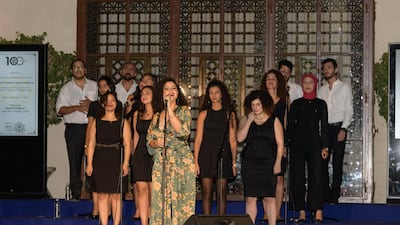The bustling street leading to Tahrir Square, where the gate to the Tahrir Cultural Centre now lies, enclosed within the walls of the historic palace that once housed the American University in Cairo, is all too familiar to downtown residents. For many, the alleys and nearby metro station are vital for their journeys into the city centre. For some, being on the street can be a little taxing, as it's a trigger for memories of the violence that played out in the aftermath of the 2011 uprising.
Last month, on the eve of a concert by the multi-instrumentalist musicians of Nass Makan, which marked the launch of the cultural centre's Ramses in Tahrir series, tension outside the gate was high. Police locked down all streets leading to Tahrir Square in anticipation of mass protests.
The concert was the first of a string of events that were planned for that week. Inspired by Amr Bayoumi's documentary Where Did Ramses Go?, the series took the 2006 relocation of a giant statue of the Pharaoh Ramses II as its point of departure.
A small crowd showed up. "Everyone was nervous about what was going to happen on September 27. Here at [the American University in Cairo], there was this oasis of culture going on that night. It was actually quite magical," Tarek Atia, the centre's director, tells The National.
"It was our first serious challenge, yet the show went on," he says, sifting through images from a panel that, despite the continued lockdown in the area, ran on schedule the following week.
Downtown Cairo has long been the heart of a ripe independent arts scene in the city. Home to numerous galleries, performance spaces and Zawya, the city's only arthouse cinema, the landscape now comes with a litany of challenges.
"You're living in a complex country with a lot of processes and a lot of structural gaps that need people to focus on ... it's not easy to navigate," says Atia, who is a former journalist, media training specialist and publisher of the community newspaper Mantiqti.
The Tahrir Cultural Centre has set out to fill the vacuum the AUC left when it moved to the suburbs at the end of 2008, says Atia, who was appointed director in July, five months after the centre formally opened. Today, the campus is also home to the AUC bookstore, the management centre, engineering services, the Centre for Migration and Refugee Studies, and the School of Continuing Education.

Together with a small team, Atia says he hopes to develop the engine that reinforces the AUC as a key player in the Downtown playground. Since February, the centre has come up with a rich programme of events. Between exhibitions, talks, film screenings, masterclasses and music concerts, the plan is to ensure that the centre is able to offer something for everyone.
Atia envisions spreading out gradually across several planes, including co-hosting, as was shown last weekend through the centre's collaboration with the Cairo Jazz Festival, during which the centre hosted musicians from nine countries across three of its stages.
There's a desire among the team, Atia explains, to work closely with existing cultural operators. This includes Zawya and its parent company Misr International Films, as well as the Downtown Contemporary Arts Festival and property company Al-Ismaelia, the driving force behind the festival and several property facelifts that have penetrated the neighbourhood in the past decade.
The centre is looking to work closely with the different university departments and their existing programmes, particularly those that are seeking a more central outlet than the university's suburban campus in which to showcase their work.
"We want to create rehearsal spaces, jamming spaces and run residencies for artists. I am personally very interested in heritage management and development," says Atia, who is a member of the state-affiliated Cairo Heritage Development Committee.
Another sphere of production, and one within which Ramses in Tahrir was conceived, is reserved for home-grown, concept-based programming. Atia says he has lofty ambitions.
"We want it to be the kind of place where people can wander in and always discover something interesting or new or intellectually stimulating, a place where families come at the weekend," he says. "We want to be a home for Cairo's long-running performances. Imagine this becomes part of every tourist's itinerary."
The centre comprises two historic auditoriums – the Oriental Hall and the Ewart Memorial Hall, where renowned Egyptian singer Umm Kulthum once performed – and eight exhibition spaces. The centre is also home to the Falaki Theatre, an important player in the independent scene, a large garden, a fountain area that functions as an outdoor performance space, and a renovated workspace-cum-cafe, which resembles that of London's Southbank Centre.
The centre was revamped thanks to funding by business tycoon Naguib Sawiris, founder of El Gouna Film Festival. But Atia says he is aware that for his plans to become a reality, in the long run, more needs to be done to secure other revenue streams.
"I think philanthropy in the cultural field is very important ... but I would like to diversify individuals and foundations that believe in the importance of culture and the arts," he says. "This is the place where those philanthropists can see impact."
For now, the centre's programming oscillates between free and ticketed events. This kind of balance, Atia says, "helps you play an important role in the whole cultural landscape".
There's certainly truth in that. But there's another important consideration within the centre's purview: how fast can independent artists, who were once the cultural heart of Downtown Cairo, reconcile with the area's violent past and come to terms with its present state?


